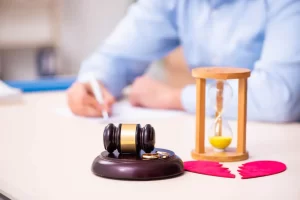Divorce Can Be a Difficult And Emotional Process For All Parties Involved, and Sometimes it can Take Longer than Anticipated to Finalize

Divorce can be stressful when the process is lengthy and drawn out. Once people make the difficult decision to divorce, they can generally expect the process to take one year from filing the complaint to receiving the divorce decree. Couples who were married for only a short while, have no children, and have simple financial arrangements could have their divorce settled within a few months. We’ll talk today about the factors that might slow your divorce down and what you can do to speed it up.
Factors That Typically Prolong a Divorce in New Jersey
- Contested issues: If there are significant disputes or differences of opinion between the parties, it can take longer to reach a settlement. For example, if there are disputes over the division of assets, child custody, or alimony, it may take longer to resolve these issues.
- Complex financial situations: Divorces involving complex financial situations, such as multiple businesses or high levels of debt, can take longer to resolve. This is because it may take more time to gather and review financial documents and negotiate a settlement.
- Lack of cooperation: If one or both parties are not willing to cooperate or communicate effectively, it can slow down the process. This can include failing to provide necessary documents or information or refusing to negotiate or compromise. It is wise to adopt the attitude of carefully picking your battles.
- Children: The presence of children involved in the divorce can slow things down. In some cases, it might be necessary to slow the settlement down because the children are nearly finished with school. Sometimes kids have after-school activities that cause challenges in scheduling a meeting.
- Unforeseeable circumstances: These might include one of the parties, or one of the attorneys, getting sick or one of the parties experiencing a change in their work schedule.
- Legal procedures: The legal system can be slow and complex, and it can take time to navigate the legal process and follow the rules of the court. This can include waiting for court dates and hearings, as well as completing required paperwork and procedures.
- Emotional difficulties: Divorce can be a difficult and emotional process, and it is not uncommon for emotions to get in the way of making decisions or negotiating a settlement. This can slow down the process as parties may need additional time to process their emotions and come to an agreement.
- Complex legal issues: If the divorce case involves complex legal issues, such as disputes over the validity of a prenuptial agreement or the interpretation of a trust, it may take longer to resolve these issues.
- Third-party involvement: If there are third parties involved in the divorce, such as a mediator or arbitrator, it may take longer to reach a settlement as additional time may be needed for these parties to facilitate communication and negotiations.
What You Can Do to Speed the Divorce Process Up
Fortunately, there are steps you can take to expedite the divorce process and make it go faster. Here are some strategies that can help you get a faster divorce:
- Keep communication open and respectful. Communication is key in any divorce case. By keeping the lines of communication open and respectful, you can facilitate a smoother and faster process. This may involve seeking the help of a mediator or other third party to facilitate communication and help both parties come to an agreement.
- Stay focused on the big picture. It can be easy to get bogged down in the details and become emotionally invested in specific issues during a divorce. However, it is important to stay focused on the big picture and prioritize what is most important to you. This can help you make decisions more efficiently and avoid getting caught up in unnecessary conflicts.
- Be open to compromise. Divorce is a process of negotiation and compromise. By being open to compromise and willing to negotiate, you can potentially reach a settlement faster and avoid a lengthy trial.
- Consider an uncontested divorce. An uncontested divorce is one in which both parties agree on all terms, including the division of assets, child custody and support, and alimony. Uncontested divorces are generally faster and less costly than contested divorces because they do not require a trial. In order to file for an uncontested divorce, both parties must be in agreement and willing to compromise.
- Gather all necessary documents in advance. The divorce process often involves exchanging and reviewing a large amount of paperwork, such as financial documents and custody agreements. Gathering all necessary documents in advance can help speed up the process and ensure that everything is in order.
- Utilize alternative dispute resolution methods. Alternative dispute resolution methods, such as mediation or arbitration, can be an effective way to resolve disputes and reach a settlement in a divorce case. These methods are typically less formal and less expensive than a trial, and they can help parties come to an agreement faster.
- Avoid litigation if possible. Litigation is the legal process of resolving a dispute through a trial. Litigation can be time-consuming and costly, and it is often best to avoid it if possible. Instead, consider negotiating a settlement or utilizing alternative dispute resolution methods to resolve any disputes.
- Follow the rules of the court. Each court has its own set of rules and procedures that must be followed during a divorce case. It is important to familiarize yourself with these rules and follow them to the best of your ability. This can help prevent delays and ensure that the process goes smoothly.
- Hire an experienced attorney. An experienced attorney can provide valuable guidance and representation throughout the divorce process. They can help you navigate the legal system, negotiate a settlement, and ensure that your rights are protected.
 A Good Attorney on Your Side Can Help Manage the Timeframe for Divorce
A Good Attorney on Your Side Can Help Manage the Timeframe for Divorce
An experienced attorney will thoroughly understand the law and how it applies to your case. They can provide valuable guidance on your legal options and help you navigate the legal system. Strong negotiation skills can work to protect your interests and help you reach a favorable settlement. They can also help you avoid costly and time-consuming litigation. If a trial is necessary, an experienced attorney can provide strong representation in court and help you present your case effectively. Sometimes It can be difficult to be objective during the emotional process of a divorce. A good attorney can provide an objective perspective and help you make informed decisions. Finally, an experienced attorney will be able to effectively manage the legal process and work to resolve your case as efficiently as possible.
Expedite Your Divorce Case – Contact our Passaic County Lawyers with Offices in Little Falls, NJ
In conclusion, several strategies can help you get a faster divorce. These include considering an uncontested divorce, utilizing alternative dispute resolution methods, gathering all necessary documents in advance, staying focused on the big picture, avoiding litigation if possible, following the rules of the court, being open to compromise, keeping communication open and respectful, and hiring an experienced attorney. By following these tips, you can potentially expedite the divorce process and move on with your life.
The attorneys at the Montanari Law Group are experienced and highly knowledgeable about how to help you settle your divorce more quickly in Wanaque, Pompton Lakes, Hawthorne, Ringwood, and throughout Passaic County and North Jersey. We will provide an objective perspective and help you make informed decisions every step of the way. Call us at (973) 233-4396 for a free consultation today.

